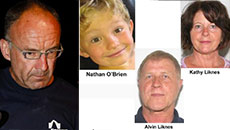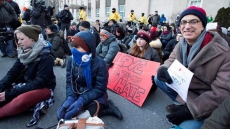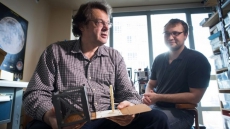VICTORIA — Among the medical diplomas, certificates and degrees on Dr. Perry Kendall's office wall is a framed copy of a newspaper with a headline that screams, "City Doctors Give Okay to Socialized Medicine."
B.C.'s provincial health officer laughs at the mock front page of a Vancouver newspaper from 1951 that was given to him by his father-in-law, also a doctor.
The page is forward looking, similar to Kendall's approach during a 45-year career in public health that started in free medical clinics in Toronto and Vancouver, and now sees him at the forefront of British Columbia's overdose crisis.
The arrival of the powerful opioid fentanyl caused 914 overdose deaths in B.C. last year, almost 80 per cent higher than the 510 deaths recorded by the provincial coroner in 2015.
The British-born Kendall said his family roots have helped him drive health policy changes that were sometimes controversial, but now are common practice.
"My father was very socially conscious," said Kendall, who has been the provincial health officer since 1999. "He was a very ethical person. So was my mother."
Banning smoking in work and public spaces, providing needle exchanges to prevent the spread of HIV and opening safe injection sites for illicit drug users have been championed by Kendall, who was city health officer in Toronto and Victoria before becoming B.C.'s provincial health officer.
He recalls how former Vancouver mayors Philip Owen and Larry Campbell supported supervised injection sites in the Downtown Eastside, despite being at opposite ends of the political spectrum.
"They saw it as a health problem and a way to stop people dying," he said.
But of all the public health problems Kendall has dealt with — such as HIV, AIDS, SARS and H1N1 — nothing has been as devastating as the opioid crisis in B.C., he said.

"In terms of morbidity and mortality, it's way above anything killing people in the time I've been in public health," he said. "The issue is, it's not something that by and large everybody thinks could happen to them, which is the difference between an infectious disease, something that terrifies us like Ebola or a pandemic."
Kendall said fentanyl is killing people from all walks of life and he's pushing the province to adopt a European-style drug treatment program that includes providing medicinal heroin to patients. The European programs work, he said, with evidence of reduced overdose deaths and stable lives for drug users.
Vancouver's Crosstown Clinic is the only facility in North America that offers medicinal heroin.
John Blatherwick worked with Kendall on anti-smoking, needle exchange, HIV infection and safe injection programs when he was Vancouver's health officer and is impressed by his former colleague's political savvy in promoting change.
"He positions things well for the politicians to be able to make some of the tough decisions they have to make. That's a really tough trick."
Kendall was appointed by the New Democrats and has held the position during four consecutive Liberal governments. He has announced his retirement twice, but never followed through.

Blatherwick said he senses Kendall has the ear of Health Minister Terry Lake on the overdose crisis.
"I see Terry Lake making statements that tell me Perry has been talking to him very earnestly and has gotten him to understand how serious the crisis is," said Blatherwick.
Lake, who acknowledges the government is considering recommendations on pharmaceutical heroin, said he and Kendall have a working relationship that resembles a professor and student.
"I learn so much from him," said Lake. "I don't think you could find any person working in public health in Canada who has the experience and helped shape the response to so many public health issues."
Prof. Bernie Pauly at the University of Victoria's centre for addictions research said Kendall's ideas get wide attention.
"When I think about who is best to be in that lead role in the province, having someone like Perry, who has been a leader throughout his career in harm reduction and prevention, I think of few who have been such a pioneer in that area," she said.




